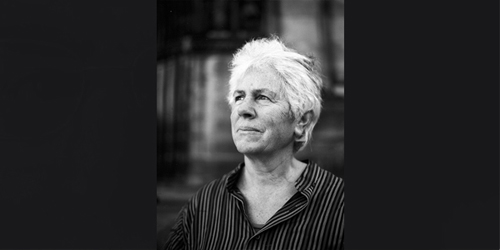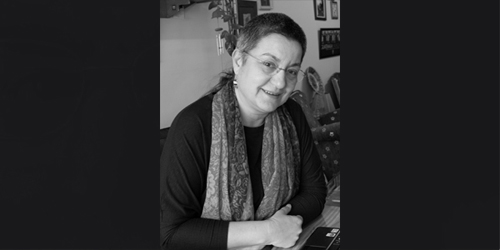The 2014 International Hrant Dink Award was presented to laureates Şebnem Korur Fincancı from Turkey and Angie Zelter from Britain, on September 15, 2014, with a ceremony organized by the Hrant Dink Foundation held at the The Cemal Reşit Rey Concert Hall in Istanbul.
The award statue was presented to Angie Zelter from Britain by the Head of the Award Committee Ali Bayramoglu and Ziena Alhajj from Greenpeace.
In 1997, Zelter was one of the six activists that initiated the Trident Ploughshares campaign that aimed to disarm the UK Trident nuclear weapons system via non-violent, direct and peaceful means. In 1999, with Ellen Moxley from the USA and Ulla Roder from Denmark, she entered the Trident Sonar testing station in Loch Goil, Scotland; where they damaged computers and electronic equipment and threw the log books, files and computer hardware overboard. After this specific action, she came to be known as a member of the Trident Three. In 2002, she initiated the International Women’s Peace Service – Palestine. In March 2012, she supported the resistance against the construction of the Jeju Naval Base on Jeju Island, declared in 2005 World Peace Island by the South Korean Government and home to a number of UNESCO World Heritage Sites. Since the mid-1990s, she has been arrested more than 100 times; these arrests played a significant role in creating public awareness and media interest on nuclear disarmament. In her award speech, Zelter stated that Britain systematically undermines and violates international law. It supports and trades weapons with some of the most repressive regimes in the world and mentioned the current developments as: “Currently it (UK) supplies arms to Israel and refuses to condemn Israeli war crimes and breaches of humanitarian law in the occupation of the West Bank and siege of Gaza.”
Angie Zelter
The award statue was presented to Şebnem Korur Fincancı from Turkey by the Jury members Baskin Oran and Saturday Mothers / People represenrarives Hanım Tosun and İkbal Eren.
Having dedicated her professional career to the struggle against torture, in the 1990s, when torture was prevalent in Turkey and covered up by authorities, Korur Fincanci was subjected to the oppression and obstructions of the state as she wrote articles on medical ethics and penned reports documenting torture. In 1996, she took part in post-mortems from mass graves in the Kalesija region of Bosnia as member of the PHR team on behalf of the United Nations International Criminal Tribunal. On behalf of the International Rehabilitation Council for Torture (IRTC), she travelled to Bahrain disguised as a tourist and collected tissue samples from the body of a young man whose remains were discovered at sea, claimed by the police to have drowned. She brought the samples to Turkey, and in the autopsy she carried out, determined that he had been murdered under torture in detention as his family had claimed. She proved the torture carried out by Adil Serdar Saçan, the former Director of the Directorate of Organized Crime Branch. Her application to intervene on the grounds that her telephone had been tapped by the Ergenekon organization and that her personal information had been filed, becoming the only intervening party in the Ergenekon case. In her award speech, Korur Fincancı gave voice to her embarrassment upon receiving the Hrant Dink Award: “I feel embarrassed because I am receiving this award as I merely try to fulfil the responsibility of being human. In addition to feeling incredibly honoured, I feel embarrassed because I am receiving the same award extended to Saturday Mothers who have been looking for people lost by the state for years. I feel embarrassed because this award means so much. I feel embarrassed because in my mind I have done what needs to be done and that does not call for an award. I feel embarrassed because what needs to be done is still not readily done in these lands. The fact that the Armenian Genocide is still discussed behind closed doors, the denial of Kurds, their annihilation, the fact that the purging out of indigenous people of this land is celebrated every year, that you live with the shame of the fact that in a neighbourhood populated by the ever-shrinking Armenian community a school is named Talat Paşa, a road Ergenekon, a street Türk Beyi, that we feel the plight of all oppressed people in our hearts but that we have failed in dressing their wounds. The embarrassment of this all…”
Sebnem Korur Fincanci
The Jury of the International Hrant Dink Award 2014 consisted of Baskın Oran, Gerard Libaridian, Kenneth Roth, Kumi Naidoo, Mary Kaldor, Oya Baydar, Rakel Dink and 2013 International Hrant Dink Awardees Nataša Kandić and Saturday Mothers / People.
Alper Gormus, Amira Hass, the Conscientious Objection Movement of Turkey, Baltasar Garzón, Ahmet Altan, Lydia Cacho, İsmail Beshikc, International “Memorial” Society Russia, Natasha Kandić and Saturday Mothers / People are the former laureates of the International Hrant Dink Award.
 Epress.am News from Armenia
Epress.am News from Armenia

